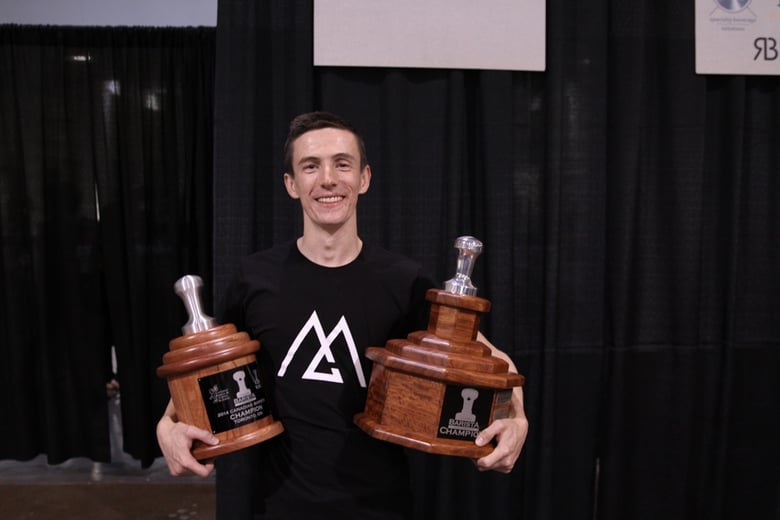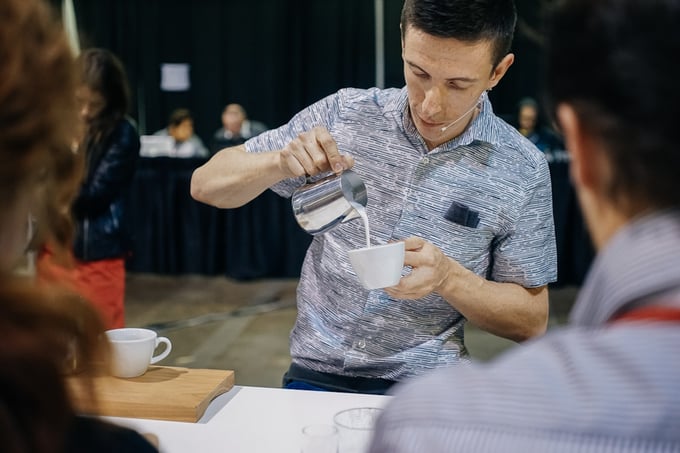Ben Put has held the title of Canadian National Barista Champion for three years in a row now, so you could say he knows his coffee.
He also came third in the World Barista Championship in 2015, where he wowed judges with his fancy brews. When he's not competing, he runs Monogram Coffee in Calgary with his two business partners.
We thought we'd call him to get his best coffee secrets. Baristas, take note: there are some golden nuggets in here.

Photo: Foodbiz.ca
You’ve competed in quite a few barista championships. What encouraged you to start competing?
I’m a very competitive person, so it just kind of happened that way. But I also think that competitions are interesting because they allow you to try things you can’t typically try in a café setting.
Most people have a set drink when it comes to a menu, like a latte or a cappuccino. A competition allows you to try certain coffees you might not typically serve. You can try new techniques and kind of showcase what you’re working on in a setting that’s reviewed by your peers.
I think a competition is a creative outlet for baristas. It forces you to rethink ideas and try new things, so it’s definitely a great tool for learning as well.
What’s the secret to making the perfect espresso?
It really comes down to two things. The most important thing, in my opinion, is your brew ratio – especially how much ground coffee you use and how much liquid espresso you are making from that. Because that controls both the strength of the espresso and the extraction percentage.
"A competition is a creative outlet for baristas. It forces you to rethink ideas and try new things, so it’s definitely a great tool for learning."
If you have pulled out too much of the espresso, it will be bitter. If you don’t pull enough out, it will be sort of grassy and have more sour flavours. That is sort of the granddaddy variable.
If that’s locked down, it’s much easier to make good coffee. A scale is really a big factor, as well as the grain size. But I would say the biggest one is the brew ratio.
And what are your tips for making a great cappuccino?
You have to start with a really good espresso base. We use a slightly stronger, more concentrated espresso for milk drinks. Then the big thing is having a great texture in your milk.
For cappuccinos, I tend to go a little bit cooler than most people would, because I think it lets you enjoy the drink more. With smaller drinks, you basically want to drink them immediately.
When you pour a cappuccino, it actually has a bit of a Guinness effect where you see the bubbles separating. In that moment, the cappuccino is really tasty. If you let it sit for a long time because it’s too hot, the foam will fully separate and the drink starts to degrade. I don’t think that’s as enjoyable as what it’s like fresh right off the counter.

Photo: Sprudge
What tips do you have for baristas who are practising latte art?
I think latte art is a lot about timing. First of all, you need very well steamed milk. The air should be totally incorporated into your milk, with small bubbles that you have injected. If your milk is far too thick, it is impossible to pour. If it doesn’t have enough air, then nothing will come out because the milk needs to be thick enough to be able to sit on the surface.
Assuming you have perfectly steamed milk, there are two things to focus on. A big one is timing. If I start pouring too soon, the air will still be fully mixed into the milk and it will all just mix together. If I wait too long, the foam in the cup will have separated, which will make my pour really small. We’ve all seen pours where there’s just a tiny heart, which looks kind of sad.
Whenever you pour a latte, you need to be as close to the surface as possible, because you need that soft angle for the milk to sit on top of the coffee. Think about how you hold your cup as well. If you tilt your cup, you can get the pitcher much closer.
You own your own coffee shop, Monogram Coffee. Do you have any advice for baristas who would like to open up their own place one day?
Know what your strengths and weaknesses are. Monogram actually consists of three partners; myself, Justin [Eyford] and Jeremy [Ho], and we all have different skill sets. I know there are things that I’m not good at and Monogram wouldn’t have been successful if I had done it on my own.
Even if they’re not your business partners, finding a confidant or someone with a skill set that rounds out yours is huge in any business, but especially in cafés that are so multi-facetted.
"Finding a confidant with a skill set that rounds out yours is huge in any business, but especially in cafés."
Obviously, you need to be good at coffee, but you have to try to understand other systems that are going on in the café as well. Understand what it takes to be a manager and that sort of thing, and then just start saving. You are going to start a small business, and even something as small as a café takes an adhesive chunk of change.
What would you say to baristas who want to start competing?
It sounds stupid; but read the rules. You can find them online and being familiar with them is key. You need to know where the points are going so you can put your time and effort into those things.
Make checklists, both for stuff you need and a list for the things you’ve practiced and what’s left to do. At the barista competition you actually have 15 minutes to set up as well as 15 minutes to compete. That set-up time is key. There are many people that I feel have lost the competition before their official time has started because the set-up was so frantic.
Also, make sure you practice a lot, even the stupid stuff. It happens to me too. I make cappuccinos every day so when I compete I feel like I don’t really need to practice. But I think I would have been much closer to winning the title last year if I had practiced cappuccinos. You have to make sure you are perfect at it, because you do not get a remake.
Drop in and visit Ben at Monogram Coffee in Calgary, or follow him on Twitter .